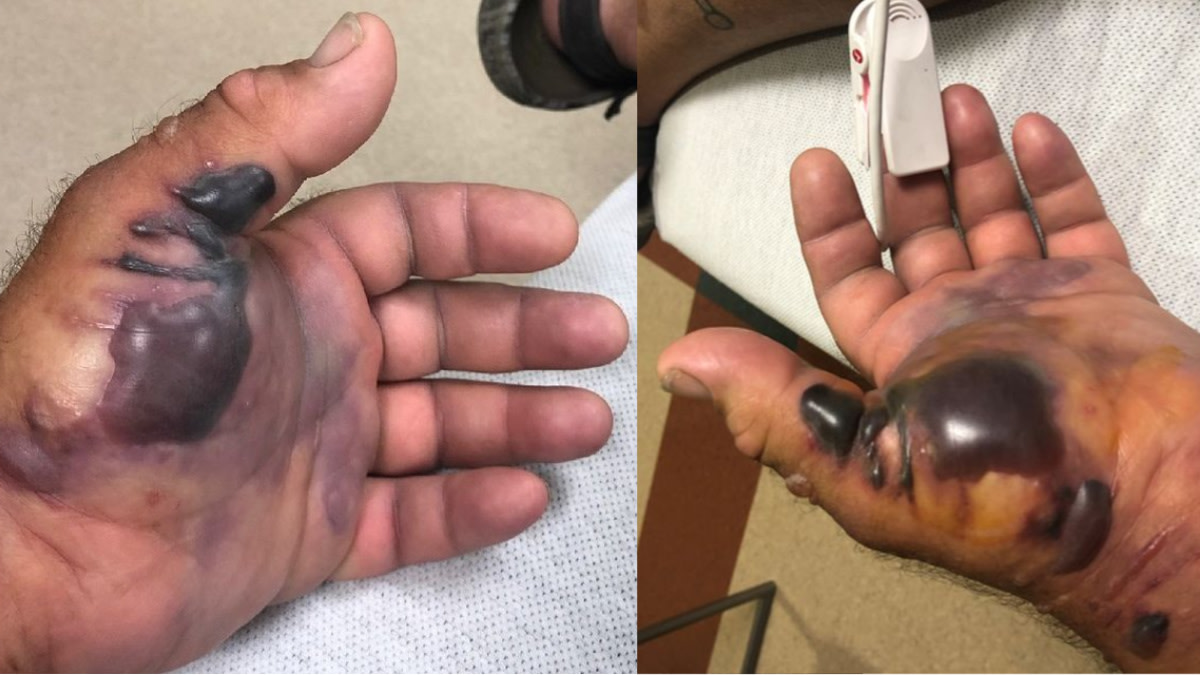
A Florida man is currently recovering from a major health scare after a minor fishing accident. Mike Walton, a Gulf Coast native, was fishing offshore last month when he pricked himself with a fishing hook. Walton has been salt water angling for over 40 years, so he thought nothing of it and simply removed the lure, as he’s done many times before.
Back on shore later that day, Walton’s palm began to swell and throb uncomfortably. He went to a local hospital for treatment, where he was given antibiotics and sent home.
The next morning, though, the swelling and discomfort had intensified and black bubbles rose on his hand and arm. “I had like little blisters starting to form on my hand and you could watch like sweat beads coming up on the side of my hand, and then they just turned black,” Walton told ABC Tampa Bay. “When you look down and you can see your own tendons, back of your hand and your bone going up your arm, that makes it real.”
Walton was quickly transferred to the burn unit, where infectious disease doctors could treat him. Specialists diagnosed him with necrotizing fasciitis, which is an incredibly rare, flesh-eating bacteria. Doctors told Walton he was lucky to be alive as they took him into surgery. “They said in a few hours, this would have gone up my arm into my chest and I wouldn’t have been there,” Walton told Fox News.
Still, it was unclear if Walton would make it out of the ordeal unscathed. At one point while operators were working to remove infected tissue, they considered amputating his entire limb. Surgeons feared that the bacteria was advancing too fast, but were able to stop the spread of the disease and replace infected sites with grafted skin.
“When I woke up, you talk about relief, is when you look over and see your thumb still sitting there,” Walton told Bay News 9.
Now Walton is recovering at his Ozona home after a two-week stint in the hospital. He’s working to regain functionality of his arm and will be on an IV for the next month. According to his GoFundMe, which has raised over $22,000, doctors are waiting on test culture results to get more intel on the bacteria. It’s feared that the infection may have been caused by a salt water strain of fish tuberculosis, which would make Walton’s case all the more rare and difficult to treat.
Walton’s story follows another one like it, where an Ohio man vacationing in Florida went through a similar experience just a month prior. Barry Briggs, who spent some time on a boat while on his trip, thought a sunburn was causing the swelling in his leg. On his flight home, though, the swelling increased to concerning levels. When he landed, he went to a local hospital where doctors spent the next 11 days working to avoid amputation.
“It was going one inch an hour up my leg,” Briggs told CNN. “I’m incredibly fortunate to have all my toes, to have my foot, to be alive.”
According to the Center for Disease Control, necrotizing fasciitis is diagnosed in 700-1200 people per year in the US. It’s rarely contagious, but is often contracted through small wounds like burns, insect bites, cuts and scrapes. The organization says it’s more likely to happen to those who spend time in hot tubs, swimming pools and natural bodies of water. Symptoms “can be confusing” and often include red or swollen skin, pain, fever, pus and dizziness. Even with treatment, necrotizing fasciitis is fatal for one in three people who develop it.
The experience has been humbling and insightful for Walton. He said the scars on his arm will be a good reminder to take precautions while fishing, like always wearing gloves and washing out any cuts with soap. It surely won’t stop him from getting back on the boat, though.
“He is optimistic and looking forward to fishing again,” Eric McLendon, a friend of Walton’s, told Newsweek. “He has been fishing his whole life here and fishes as often as possible. He would fish every day if time would allow.”
Feature image via GoFundMe.





Conversation